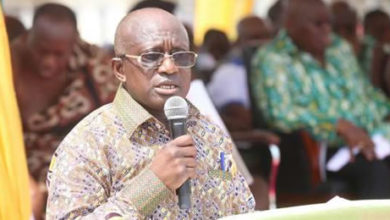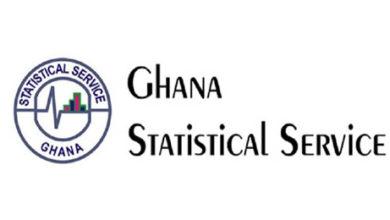Gyampo: E-Levy will worsen plight of loyal tax payers

Ransford Gyampo, an associate professor in the Political Science Department of the University of Ghana, has expressed reservations about the new E-Levy in the 2022 Budget.
The Minister for Minister, Ken Ofori-Atta on Wednesday (17 November) announced a 1.75% tax called E-levy on mobile money and all electronic transactions in the country as a measure to “rope in the informal sector into the tax net.”
However, Prof Gyampo said although the government has adopted a smart move to widen the tax net, the introduction of the E-Levy will worsen the plight of loyal tax payers.
“There is a smart move to widen the tax net through the abolition of the road tolls and the introduction of the E-Levy. But this worsens the plight of we the loyal tax payers,” Gyampo said in a Facebook post.
“Even though those who evaded many taxes will now be brought on board, those whose toil and suffering have nourished the politician and kept article 71 office holders, I mean those of us who are unable to look at the tax component of our pay slips because of the huge deductions there, are going to pay more taxes via the E-Levy window.”
Below is the full post
My Preliminary Take on the 2022 Budget Presented By Ken Ofori Atta, Minister of Finance
- There is a smart move to widen the tax net through the abolition of the Road Tolls and the introduction of the E-Levy. But this worsens the plight of we the loyal tax payers.
- Even though those who evaded many taxes will now be brought on board, those whose toil and suffering have nourished the politician and kept article 71 office holders, I mean those of us who are unable to look at the tax component of our pay slips because of the huge deductions there, are going to pay more taxes via the e-levy window.
- The common mathematical principle in primary one, when we were in elementary school was, “if more, less divides”. With this, if lecturers and other public servants are already paying more taxes, you don’t increase their tax burden even when you get more people to also pay taxes.
- I would urge Parliament, particularly the minority group to use their strength and take advantage of the current nature and composition of the House to address this issue.
- People are worried that the budget didn’t mention UTAG demands specifically. But this isn’t the norm. No budget singles out specific demands of labor unions. To get an idea of what can be done for labor, one must look at the component of the budget on compensations. I have looked at it. It’s a bit more than that of 2021. But as to whether it would cater for UTAG demands, time and the speaking of the only language better understood by governments would tell.
- University Teachers made demands before the 2022 budget was prepared. Hence we are certain that no one would tell us our demands weren’t factored into the budget. Government is already aware of our stance. We will vacate and reopen no more, should they fail to meet our demands.
Yaw Gyampo
A31, Prabiw
PAV Ansah Street
Saltpond
&
Suro Nipa House
Kubease
Larteh-Akuapim
E-levy will plug revenue loopholes
Meanwhile, the Deputy finance minister, Abena Osei Asare, has said E-levy will help plug revenue loopholes in the country.
Some experts have since warned that the new levy is “retrogressive” and could affect the government’s quest to deepen financial inclusion.
However, speaking on The Asaase Breakfast Show on Thursday (18 November), Asare disagreed.
“In every country, citizens pay taxes but what you do is that you make the taxes progressive such that those who earn more feel the burden of the tax more than those who earn less. That is why in this electronic transaction levy that we are coming out with, those who do a GHC100 cumulatively everyday are exempted from paying this levy,” she told Nana Yaa Mensah on the show.
“We did a study and realised that over close to 42% of people who do MoMo (mobile money) transactions everyday between GHC 1 and GHC 100 are about 42%, so clearly government is thinking about those people and saying that for those people they are exempted from the E-levy.
“But for those of us who do more than GHC100 everyday, it’s a progressive tax. It is for the good of this nation that we all raise the necessary taxes and be able to fund government’s flagship programmes,” she added.
Asare said the introduction of the E-levy is strategic.
“Many a times people talk about raising tax revenues, how do you formalise the economy and we have realised a niche in electronic transactions. According to UNECA, the digital economy has grown from 11.5 trillion in 2016 and is going to 23 trillion, we also want to take advantage of it.”
Background
The government has decided to place a levy on all electronic transactions to widen the tax net and rope in the informal sector.
“Electronic transactions covering mobile money payments, bank transfers, merchant payments and inward remittances will be charged at an applicable rate of 1.75%,” Ofori-Atta said, “which shall be borne by the sender except for inward remittances, which will be borne by the recipient.
“This new policy comes into effect from 1 February 2022. The government will work with all industry partners to ensure that their systems and payment platforms are configured to implement the policy.”
As of January 2021, 38.9% of the population aged 15 years and more had a mobile money account in Ghana.
The share of mobile money users increased over the previous three years but decreased slightly in 2021 from 39% in 2020.
Share of population with a mobile money account in Ghana (2018 to 2021)






